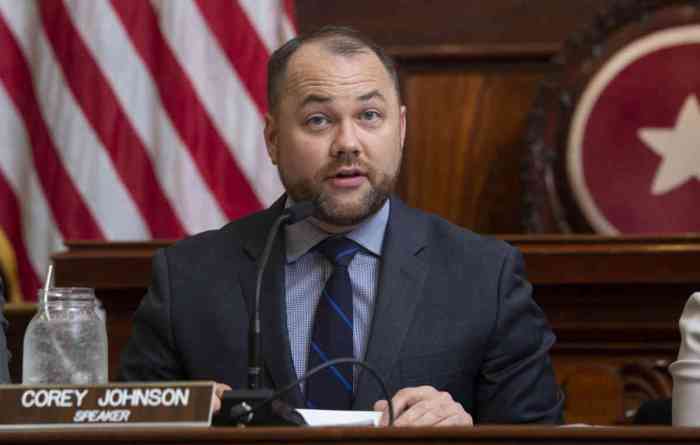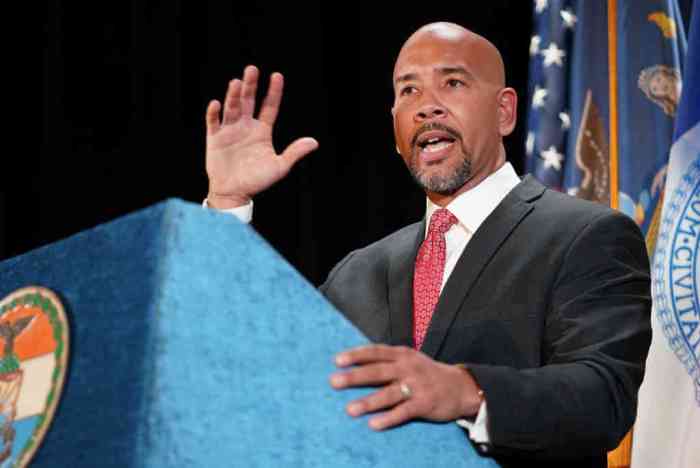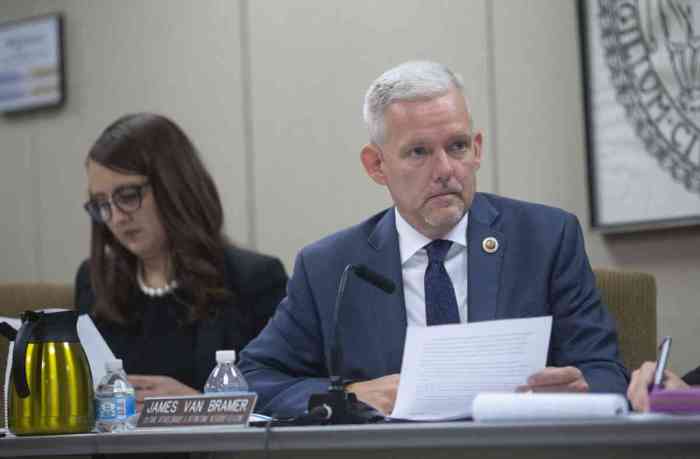The trumpets did not sound when the New York State Assembly elected Carl Heastie speaker to replace Sheldon Silver, amidst murmuring outside Albany’s inner circle that the new man was hardly a breath of fresh air. Despite the historic election of the Assembly’s first African-American speaker, he was viewed with suspicion by critics of the capitol’s checkered history of corruption.
To be sure, Heastie was greeted with open arms by his Democratic colleagues. When other would-be speakers declined to contest the race to succeed Silver, he was elected without opposition.
Despite the low expectations voiced by some outsiders, the early notices on Speaker Heastie are favorable. He evinces “good vibes,” one observer noted, and has won praise for protecting New York City from Governor Andrew Cuomo’s budget-cutting ambitions while giving progressive measures the hearing the Democratic left wants. People are happy with the job he’s doing.
The Long View
The Democratic Party has been the avenue for Carl Heastie’s success and he is likely constitutionally opposed to draconian law and order measures. But Silver became a lightning rod for conservative attacks by resisting the most extreme measures coming out of the Republican Senate. It’s unclear if Heastie is prepared to spearhead the drive for undoing the ills of mass incarceration in New York State.
Last year, naysayers slyly called him “the boss” of the Bronx Democrats and repeated the unhappy tale of his mom. In the last year of her life, she pled guilty to stealing money from the not-for-profit where she worked, using the money to buy a home. Critics honed in on then-Bronx DA Robert Johnson, who did not take action to seize the home and so allowed it to stay in the family.
The gut issue for many reformers after Silver’s arrest was ethics and the negative buzz surrounding Heastie in his early days as speaker involved the fear he would be soft on corruption.
Now the skeptics are retreating.
“The vibes are very positive,” said SUNY New Paltz political scientist Gerald Benjamin, a neutral observer who specializes in New York State politics. “He visited every county and went to bat for NYC.”
Heastie’s progressive Democratic colleagues are also pleased.
“Speaker Heastie stepped into the office under very difficult circumstances and hit the road running” is Chelsea Assemblymember Dick Gottfried’s upbeat assessment. The chair of the Assembly Health Committee, he has represented Manhattan’s West Side since 1971 and been at the center of every fight for state funding to battle AIDS.
“We’ve got more freshman and sophomore members who are a very vocal group,” Gottfried said. “Carl has been very good at hearing everything they have to say and been very responsive.”
A top priority for Gottfried is bringing single payer health care to New York State. On June 1, his bill that offers coverage without private insurance premiums passed 92-53. The measure won’t win approval in the Senate, but one-house bills represent progress nonetheless, by moving an issue higher up on the Albany agenda.
Money is a key driver of Heastie’s rising popularity. The New York Times called the Cuomo’s proposed budget “colossally bad for New York City.” The state would have “shrugged off” $485 million annually for CUNY, leaving the City to make up the difference. Medicaid changes would have shifted $300 million dollars onto the city budget. Combined, those two items amounted to three quarters of a billion dollars in new expenses mangling the city treasury. This was the governor’s hammer hanging over the city’s head, and Heastie had the responsibility for getting us out from under it.
He succeeded. The Medicaid and CUNY cuts were restored and a $15 minimum wage passed — even as budget cutters retained an upper hand going forward with a massive tax cut planned for 2018.
Ambitious but careful to nurture relationships with the other members, Heastie is especially well prepared to negotiate budgets. He graduated from SUNY Stony Brook with a degree in applied mathematics and statistics, and then honed his budget skills working for the New York City comptroller’s office. Later, he added an MBA in finance from Baruch.
Ken Lovett, the Daily News Albany bureau chief, declared Heastie “the biggest winner in the budget sweepstakes.” In an email release, Mayor Bill de Blasio thanked him for “fighting to fend off devastating cuts,” saying he has “proven to be a strong leader and fierce protector of the City of New York.”
Another enthusiastic supporter is Charles King, president of Housing Works, a leading spokesperson for the effort to end the AIDS epidemic in New York, a public health campaign based on increasing viral suppression among those living with HIV. With viral load effectively suppressed, a person is not contagious, and the way to get there is to keep HIV-positive people on their medications. Meanwhile, a person taking PrEP, or pre-exposure prophylaxis, can stay negative, again if they adhere to their treatment regimen, even if exposed to the virus. The effort, then, is based on getting medicine into the hands of individuals and then helping them stay on those meds.
Heastie has “done an incredible job at this point,” King enthused. “This last session the governor made an incredible attack on the city partially to preserve his record for keeping budget increases to two percent or less and from his vindictiveness toward the mayor.”
A sharp cut in Medicaid was reversed, King said, based on efforts by Gottfried, the Assembly’s Black, Puerto Rican, Hispanic & Asian Caucus, and Bronx Borough President Reuben Diaz, Jr., who “has Heastie’s ear.”
But the success of the drive to permanently bend the curve on new HIV infections and effectively end the epidemic, King explained, relies on getting more people living with the virus onto medication, and that in turn depends on providing housing for those among that population who are currently homeless. Without stable housing, drug regimen compliance is not a realistic goal, advocates say. And, as Gay City News reported in its last issue, those committed to the fight against AIDS are pressing the governor and legislative leaders for at least $50 million in the coming fiscal year out of a $2 billion pot of money Cuomo has pledged for state housing needs overall.
Beyond this year, the budget picture is foreboding, with the governor and the Republican Senate having successfully pushed through a broad tax cut to take effect in 2018. That could mean a future of austerity budgets and diminished public services. In response, Heastie has proposed a tax increase on New Yorkers making more that $1 million, but the Senate is opposed.
During the years he advanced in the Assembly, Heastie proved his potential for growth. Initially an opponent of marriage equality, he shifted his position when it counted and Senate approval was in the offing. He now leads a majority of 105 in the 150-member Assembly, and his ability to defend that lopsided margin in November will weigh in any final assessment of his first round as speaker.
In Professor Benjamin’s assessment, though, he has already shown surefooted leadership that has placed “the collective interest of the conference over the personal interest of his borough and his ethnicity.”

































